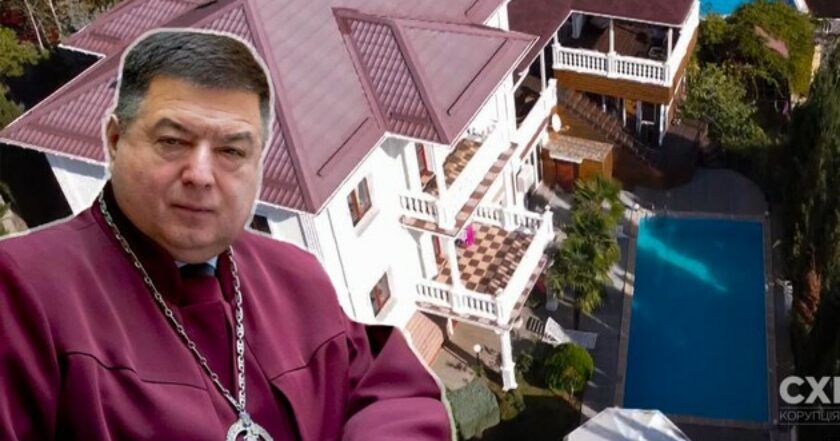CCU Chairperson didn't declare land property in Crimea, then became owner after occupation under Russian laws - Schemes

The Head of the Constitutional Court Oleksandr Tupytskyi became the owner of land property in the Koreiz village in the occupied Crimea in 2018, drawing up a sale contract under Russian law, but didn't include this information in his annual declaration of property and income.
Schemes stated this in their material.
According to the investigation, before the Crimea annexation by Russia in 2014, Tupytskyi owned an estate and land in Koreiz near Yalta. But in 2018, he expanded his possessions, registering another parcel near the house as his property. The evidence is an official document received by journalists from the Unified State Register of Real Estate of the Russian Federation.
Thus, in July 2018, Tupytskyi (at that time, he was the deputy head of the CCU) executed a contract for purchasing land with an area of 126 square meters from a citizen of the Russian Federation Vladimir Risyatov. Tupytskyi's declarations for 2018 and 2019 don't mention that he became the owner of another real estate object.
Knowingly filing inaccurate information in the declaration by the declaring subject is a violation as defined by Article 366-1 of the Criminal Code of Ukraine. It was the article that on October 27, the Constitutional Court of Ukraine, headed by Oleksandr Tupytsky, found not complying with the Constitution of Ukraine.
In addition, Tupytskyi executed the land purchase and sale agreement in the Crimea under the laws of the Russian Federation. The Federal Service for State Registration, Cadastre, and Cartography of the Russian Federation show it.
Meanwhile, as a member of the Public Council of Integrity, lawyer Roman Maselko explained, Ukrainian officials are legally restricted "to interact with illegal bodies established in the temporarily occupied territory."
"A judge has no right to enter into relations with the occupying authority. There is Article 9 of the Law of Ukraine "On Ensuring the Rights and Freedoms of Citizens and the Legal Regime in the Temporarily Occupied Territory of Ukraine." He as a representative of the judiciary must hold to a stance that these authorities are illegal. If he purchases a property, he recognizes their legitimacy. In addition, according to the Code of Judicial Ethics, a judge is obliged, both professionally and privately, to demonstrate conduct that supports the credibility of the courts and refrains from actions that could harm the credibility of the authorities. Obviously, acquiring property in Crimea in 2018 under the law of the occupiers is an unworthy act for a judge of the Constitutional Court, and therefore contains signs of misconduct incompatible with the status of a judge. He can be fired for that, but only the Constitutional Court can do it by two-thirds of the votes," Maselko explained.
Journalists searched for the seller of the land, Vladimir Rysyatov. He said that Oleksander Tupytskyi is his neighbor in Koreiz. Their villas are nearby. "The parcels were defined incorrectly," Rysyatov said. He explained that they had agreed with Tupytskyi to draw up a purchase agreement under Russian law, although "there was no sale."
"There was no sale, there was nothing there. We executed a sale contract, but this land was not mine. That's what I will say," he said.
Meanwhile, lawyers explain that if a judge received land from another person for free, under anti-corruption law, it can be interpreted as an illegal gift.
According to the director of the "Status" real estate agency (Yalta) Eduard Kiss, the market value of one hectare of land in Koreiz ranges from $5 thousand to $15 thousand.
Schemes asked the head of the CCU to comment on his property. The press service of the CCU stated that "all information about the property owned and used by the head of the CCU Oleksandr Tupytskyi is in his annual declaration."
We should note that on October 27, under the chairmanship of judge Tupytsyi, the CCU voted to declare the article on criminal liability for declaring false information unconstitutional and canceled it.
The National Agency for Prevention of Corruption (NAPC) stated that the judges made this decision in their own interests. According to the anti-corruption agency, two members of the CCU entered inaccurate data in their declarations and are now probably trying to avoid responsibility.
The Constitutional Court stated about "constant pressure" from anti-corruption bodies.
























































